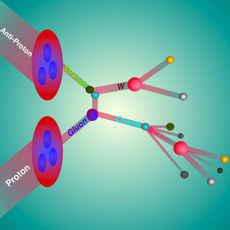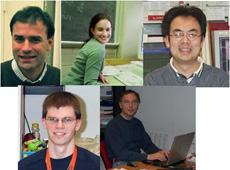|
Thursday, Jan. 3
Happy New Year!
THERE WILL BE NO SEMINARS THIS WEEK
|
Thursday, Jan. 3
- Santa Fe black bean
- Sloppy Joe
- Chicken cordon bleu
- Steak
- Baked ham & Swiss on a ciabatta roll
- Assorted slice pizza
- Crispy fried chicken ranch salad
Wilson Hall Cafe menu |
|
Thursday, Jan. 3
Dinner
- Closed
Wednesday, Jan. 9
Lunch
- Cheese fondue
- Marinated vegetable salad
- Fresh fruit plate
Chez Leon menu
Call x4598 to make your reservation. |
|
|
Fermilab-related experiments in 2007's top science stories
 |
| The Pierre Auger Collaboration's correlation between active galactic nuclei and the highest-energy cosmic rays that hit earth was among the media's favorite scientific breakthroughs in 2007. The result made the cover of Science on Nov. 9. |
Results from Fermilab-related experiments made a lasting impression on the scientific community in 2007. Scientific media named projects involving the laboratory as the top science or physics stories of the year.
The announcement by the Pierre Auger Collaboration that active galactic nuclei were the most likely source for the highest-energy cosmic rays that hit the earth toped the list of breakthroughs and science stories for three national media organizations.
The journal Science, listed the correlation third among all scientific breakthroughs of the year.
The editors at Nature magazine picked it as one of their
favorite stories of the year not published in Nature.
The American Institute of Physics named it as one of the top
10 physics news stories of the year.
Also among the AIP's 10 top physics stories of 2007, were the CDF and DZero experiments' announcement of new
measurements that shrink the window on the Higgs mass; and the
MiniBooNE collaboration's ruling out of a fourth neutrino.
Physics World's best news stories in 2007 featured the MiniBooNE neutrino result and the Auger announcement
about the source of highest-energy cosmic rays. Other top physics-related
stories were about the Large Hadron Collider, the International Linear
Collider, more evidence for dark matter and the budget cuts in the UK and
the U.S.
|
Konigsberg re-elected as CDF co-spokesperson
 |
| Jacobo Konigsberg was recently re-elected as a CDF spokesperson. |
Jacobo Konigsberg will continue to help lead the CDF charge into the energy frontier in the quest to find the Higgs boson.
The roughly 600-member collaboration of 14 countries elected Konigsberg as one of two spokespersons Dec. 6 over three other candidates. The two leadership positions have staggered two-year terms. This is the University of Florida professor's second term as spokesman.
"CDF is very fortunate to have four very capable individuals interested in leading the experiment. This indicates how vibrant this collaboration still is," said Robert Roser, who has served as co-spokesman for the past year. "Jaco and I make a strong team, and I am sure we will have a lot of fun together in the coming year."
Spokespersons are the experiment's face to media, politicians and funding agencies. Responsibilities include setting the collaboration's scientific priorities, monitoring research data publication, attending peer conferences and appointing and working with experiment managers.
"The last two years have been very exciting. Run II came into fruition with a tremendous amount of data and we have been able to bring much to the physics world: increased precision in the top mass and W mass, discovering WZ events and new particles, near discoveries of ZZ and single top, and discovering Bs oscillations," Konigsberg said. "I feel like we have a lot to accomplish still with CDF and that many surprises are waiting for us."
P5 recently endorsed running the Tevatron through 2009, but part of Konigsberg's challenge as spokesman will be to push for operation through 2010. The extended run would help in the grab for the Higgs boson, increase discovery potential and continue a tradition of launching the research careers of post docs and students, Konigsberg said.
"If we were to shy away from challenges we wouldn't be doing this," Konigsberg said.
Konigsberg has worked on CDF since 1990. He helped design the luminosity monitor for Run II of the Tevatron, worked on the analysis team that discovered the top quark and serves as a professor and head of the CDF group at the University of Florida.
-- Tona Kunz
|
Fermilab Director speaks to Chicago Public Radio about budget crisis
From Chicago Public Radio's Eight Forty-Eight , Jan. 3, 2007
WBEZ Chicago Public Radio's program Eight Forty-Eight features an interview with Fermilab Director Pier Oddone regarding the federal bugdet cuts to High Energy Physics, what they mean for Fermilab and on efforts to restore the funding cuts. The interview will air from 9-10 a.m. and then reair from 8-9 p.m. tonight.
Listen online
|
|
|
CDF scientists see
strange in a proton

Sketch of a proton-antiproton collision, producing a W boson and a single charm quark
Particle accelerators are similar to X-ray machines: they can give an image of places that the naked eye cannot see. Just as an X-ray scan can produce a picture of the human body or of the contents of a suitcase at the airport, particle collisions at Fermilab's Tevatron can produce an image of the innards of a proton. The picture is inferred from the fragments of the collisions. Inside protons, particles called quarks are bound together by the strong nuclear force. Quarks come in six types; up, down, charm, strange, top and bottom. Two up quarks and one down quark make up the proton. However, quantum mechanics and special relativity predict that the energy inside a proton can create pairs of quarks, which immediately are re-absorbed, creating a "sea" of additional quarks. A scan inside the proton enables scientists to view this quark sea, including the strange quark, which is heavier than either of the constituent types.
A new scanning technique used by CDF physicists is based on the detection of two well known, but unstable, particles in the fragments of the collisions: a W boson and a single charm quark. The primary production mechanism at the Tevatron for a W boson, along with a single charm quark, requires the interaction of a strange quark inside the proton. Because of this, the number of times these particles are found is a direct measurement of the density of strange quarks in the proton. This measurement, a world first, determined the rate of production of a W boson with a single charm to be 9.8+/-3.2 picobarn. This paves the way for the precise determination of the strange quark density in the coming years at the Tevatron. The improved knowledge of the distribution of strange quarks in the proton will allow physicists all over the world to calculate with increased accuracy the production rate of hypothesized particles, such as an electrically-charged Higgs boson.
Learn more

From left to right: Lucio Cerrito, University College London; Alice Bridgeman, Xiaojian Zhang, Ulysses Grundler and Tony Liss, University of Illinois
Result of the Week Archive
|
Congressional scientists call for a
Presidential debate on science & technology
From Science Debate 2008,
Dec. 26, 2007
NEW YORK - A Republican and a Democratic member of the United States Congress, who are each also scientists, are leading an effort to push for a presidential debate on science and technology policy.
Congressman Vern Ehlers, R-MI, and congressman Rush Holt, D-NJ, have agreed to co-chair the non-partisan initiative, called ScienceDebate2008.com, whose signers also include fourteen Nobel laureates, several university presidents, other congresspersons of both parties, the president of the Academy of Evangelical Scientists and Ethicists, and the heads of several of America's major science organizations, including the American Association for the Advancement of Science.
Read More
|
|
Have a safe day!
Project X physics workshop Jan. 25-26
Fermilab will host a second users' workshop Jan. 25-26 to discuss the physics of Project X. The workshop will focus on the details of the experiments that might be proposed to take advantage of a high-intensity proton source, their physics impact
and the development of the overall experimental strategy. Information about the
workshop, working groups and ongoing efforts is available online.
New location for International Services
The Visa Office and Assignment Services have joined the User's Office to form International Services. The office has moved to the first floor of Wilson Hall on the west side. The contact information is as follows: Amanda Petersen, x4203; Barb Book x3111; Melissa Clayton Lang, x3933; and John Galvan, x3811. The mail stop is MS 103 and the fax is x3688.
Fermi Kyuki-Do Class begins Jan. 7
Want to start the New Year out right with practical exercise? Kyuki-Do is a practical method of self defense that will teach you three important things: balance, power and grace. Classes are held for six weeks on Monday and Wednesday from 5-6 p.m. at the Recreation Facility in the Village. You need to register through the Recreation Office and also be a member of the Recreation Facility.
Brown Bag Seminar Jan. 25
There will be a Brown Bag Seminar in Curia II from noon to 1 p.m. on Jan. 25 entitled "Who moved my Cheese" by Preston Harley, M.D.
Additional Activities |
|